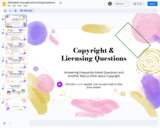
Answering Frequently Asked Questions and Another Way to Think about Copyright.

Answering Frequently Asked Questions and Another Way to Think about Copyright.
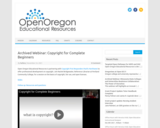
This webinar complete with slides, a video, and an extra resources/Q&A briefing at the end is a wonderful place to start if you've never studied copyright before. It could accompany some basic copyright readings, or be used as a copyright primer on its own. It is geared towards a library science audience and is a straightforward introduction to copyright formation, fair use, basic licensing, and Creative Commons licensing.
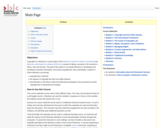
This open education online course is designed for librarians to gain a basic understanding in copyright, international copyright issues, licensing, and it even contains a module on traditional knowledge and activism.
The modules on activism and traditional knowledge make this resource a bit unique and useful as an add-on to any "traditional" copyright training modules.
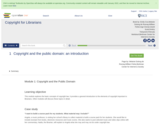
This is a full length textbook explaining copyright for librarians. It has a particularly helpful chapter explaining international treaties and the Berne three-step test. The chapter on "creative approaches and alternatives" has a helpful introduction to the Creative Commons as well as Open Access.
It also has helpful case study examples to demonstrate the concepts in an applied manner which really will help students to better understand the content of the textbook.
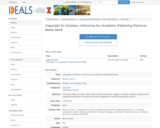
This book chapter provides a lesson plan for those wishing to engage a scholarly academic audience with copyright implications for authors and how to negotiate an academic publishing contract. It is an interactive "game" where students play either the author or the publisher and negotiate copyright, open access, and article publication fees.
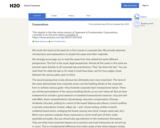
We wrote this book as the basis for a first course in corporate law. We provide extensive introductions and explanations to situate the cases and other materials.We strongly encourage you to read the cases from two related but quite different perspectives. The first is the usual, legal perspective. Almost all the cases in this book are seminal cases familiar to all corporate law practitioners. They “lay down the law.” You can read them for what the law is, for what it could have been, and for how judges chose between the various paths open to them.The second perspective is less obvious but ultimately even more important. The facts of the cases demonstrate how corporate actors use the building blocks of the corporate form to achieve various goals—they illustrate corporate law’s transactional nature. There are infinite permutations of the various building blocks, so we can’t show all. But we have endeavored to include a good selection of standard transactional scenarios—buy-and sell-side M&A, share reclassifications (Zuckerberg), executive compensation (Disney), dividends (Sinclair), jostling for control of the board (Blasius and others), control conflicts in private corporations (Coster; eBay), etc.—and moves (voting, written consent, unilateral board action, enlarging the board, issuing new stock, merger, asset sale, etc.). Most court opinions evaluate these maneuvers or some small part of them under equitable principles. But you should also pay attention to the maneuvers themselves. They are what most corporate lawyers do in practice and most maneuvers do not end up in court. This is a fundamental difference from other areas of law where lawyers mostly get involved at the back end, so to speak.A separate reason to pay great attention to the facts is that much of corporate law consists of broad standards that take on real meaning only in their application. Understanding the law often requires reading the full facts. The judges clearly considered these factual details important, even on appeal, and so should you!With one exception, all cases in these materials are Delaware or federal cases. Delaware law is the dominant corporate law of the United States. In the U.S., each state has its own corporate law, and the applicable law is the law of the state of incorporation. Corporations are free to incorporate where they want, in return for paying incorporation tax (“franchise tax”) in that jurisdiction. Delaware has attracted more than half of all public corporations and many private corporations in the U.S. (Delaware derives a third of its state revenue from the franchise tax!) Furthermore, Delaware is also the model followed by many other states. As a result, we see no point in teaching you other states’ law. We occasionally use other countries’ laws to expose you to alternative arrangements; the variance between countries is much larger than between U.S. states.For similar reasons, we teach only corporations proper. We do not cover partnerships, limited liability companies (LLCs), or the many other entity forms now available. These other forms are undoubtedly important in practice. But an introductory course cannot teach the nuanced differences between these forms, many of which lie in tax law. We only give you a brief warning about accidental partnerships in the first class. However, there are substantial commonalities between the various entity forms. If you understand corporate law and the underlying business problems, you will easily learn the other forms when the need arises.GlossaryBylaws = a corporation’s secondary governing document (cf. DGCL 109(b)). The charter can provide, and usually does provide, that the board can amend the bylaws without shareholder consent (DGCL 109(a); contrast the charter itself, which can only be amended by board and shareholders jointly, DGCL 242(b)).Certificate of Incorporation = a corporation’s founding and primary governing document (cf. DGCL 102).Charter = certificate of incorporation.Common stock / share: see share.Debt holders = creditors.DGCL = Delaware General Corporation Law, i.e., the basic Delaware statute. As a guide to this important statute, you might want to consult simplifiedcodes.com.Dividends = an official distribution of cash or other assets to all shareholders of one class. Even though dividends are generally the only way shareholders as a group get a return on their investment (individual shareholders can also sell their shares, but that only puts the buyer of the shares into the seller's shoes), dividends are in the board's discretion (DGCL 170(a)).Equity; equity capital = the excess of assets over liabilities, if any (or equivalently, non-debt financing).Equity holders = shareholders. The term derives from the fact that roughly speaking, equity is available for distribution to shareholders.Limited liability = no liability (of shareholders). The expression “limited” comes from the observation that shareholders stand to lose whatever they put into the corporation, as this is available to satisfy the corporations' creditors' claims. However, shareholders have no liability beyond that, absent pathological circumstances.Merger = the fusion of two corporations into one (cf. DGCL 251).Preferred stock / share = stock with special rights (“preferences”), generally with respect to dividends. A standard term is that preferred shares are entitled to a certain dividend per year, payable if and when a dividend will be paid to common stockholders. In return, preferred shares often do not carry voting rights.Public corporation = a corporation whose stock is publicly traded, usually on a regulated stock exchange such as the New York Stock Exchange.Share = an interest in the corporation with rights that are defined by the corporation’s charter. Unlike debt, shares do not provide a right to fixed payouts. Rather, the board decides if and when shareholders will receive so-called dividends. The default rule is that each share provides one vote (cf. DGCL 212) and equal dividend rights; such shares are called “common shares” or “common stock.”Stock = a synonym or collective term for shares (as in “twenty shares of the corporation’s stock”).
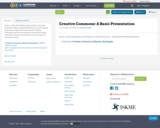
This is a short PowerPoint (with sound!) on Creative Commons. This is a brief introduction on what Creative Commons is, the basic terms used for Creative Commons, and how the licenses can be used to share work with a variety of restrictions, from very open to somewhat closed.

This open access book is tailored to educators and librarians to teach them more about how to use and apply creative commons licenses. The book covers the basics of copyright law and licensing, as well as how to choose, find, and use creative commons licensed materials. There is an entire section of the book specifically dedicated to creative commons for educators and librarians, including chapters on open access to scholarship, open pedagogy, open educational resources, and more.
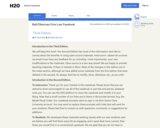
Introduction to the Third Edition.We will keep this brief--the Second Edition has most of the information we'd like to convey about the benefits of using open-source materials. Instructors--please let us know via email if you have any feedback for us, including--most importantly--your own modifications to the materials. Open source is a two-way street! We are happy to provide teaching materials, if there is interest in them. Most of the changes in this edition are in the notes section, although we have added some materials from the first edition that were deleted in the second. As always, feel free to modify, clone, distribute, etc., as you wish.Introduction to the Second Edition.To instructors: Thank you for your interest in this casebook. Please know that you are welcome (even encouraged) to use all of the casebook or just bits and pieces, whatever suits you. You can use the H20 platform to clone the casebook and modify it to your liking. Note that a small number of our links are to items in the private domain (e.g. the Model Penal Code). Our casebook prompts users to sign in via their Santa Clara University account. You may want to replace these prompts with links that will work for your students. Please feel free to contact us with questions, comments, or suggestions for additions.To Students: We developed these materials working closely with our own students, and we believe you will find them every bit as engaging, and a good deal more current, than those you would find in a conventional casebook. We are glad that you do not have to spend 200 dollars plus on a casebook that, by and large, relies on public-domain cases. In our view, the for-profit law school casebook industry amounts to commercial exploitation of students: The cost of casebooks is one of many social and economic justice issues that, inter alia, contributes to a lack of diversity in the legal profession. It is an easy problem to fix. If your other classes have expensive casebooks, you might invite your professors to examine our casebook, and to reach out to us for advice on how to make the change to open-source materials.To Everyone: We believe there's something important about a casebook that is collaborative and open. It is a reminder that the law is a community project; one that is iterative and ongoing, one that must speak across difference. This belief is reflected in our substantive choices. For instance, our study of criminal law includes materials about prison abolition, it features notes that help students "talk back" to cases, and uses cases that offer greater representation than that found in most conventional casebooks. It also embraces the notion that there is no one definitive casebook--no "canon" of criminal law. Casebooks arose at a time when concerns about inclusivity and diversity were largely absent from the academy--not because the world was different, but because the academy was different. We hope that this project helps, in some small way, to contribute to unraveling (or at least questioning) the wisdom of the status quo.Many thanks to our excellent Summer 2021 research assistants, who helped us improve the casebook dramatically: Ryba Bhullar, Tessa Duxbury, Olivia Salguero, and Swathi Sreerangarajan.W. David Ball and Michelle Oberman, Santa Clara, CA, August 2021Introduction to the First EditionThis casebook is the result of a collaboration with a team of 11 law students, who worked with us over the course of the pandemic summer of 2020. Our project aimed to redress some of the shortcomings of conventional casebook approaches to criminal law. Too often, casebooks surface issues of mental health, sex, gender, race and sexual orientation without meaningful context to situate how these issues have been treated by the criminal legal system, how they reflect social norms, how they have changed over time, etc.). Too seldom do casebooks invite a meaningful discussion of the role of race in the criminal legal system. Instead, most are marked by a failure to acknowledge, let alone grapple with ongoing discussions of alternatives to policing, alternatives to criminalization, and critical thinking about why we deal with social problems via the criminal legal system (But see Cynthia Lee and Angela Harris’ excellent Criminal Law text for an exception). Our aim in compiling these materials was not to sanitize criminal law; it is by definition a gritty, challenging subject. Instead, we sought to be thoughtful about when and how we expose students to difficult material, aiming to give them the context and the analytical tools needed to process it. This casebook is the result of a team effort to reconsider and reframe the criminal law cannon (so many casebooks use the same cases, after all).Our working model has been central to our work, rendering this casebook less a “product” than the current version of a collective, collaborative, work-in-progress. “Our” casebook is yours—clone it, revise it, make it truly your own. And let us know how you’ve improved on our work. It is not just law as code, to quote one of our former professors Larry Lessig—it is “casebook as coding project.” The beauty of the open casebook system is that we will continue to edit and revise the materials as we use them this semester. If you would like more information about the casebook or the project, please contact David Ball or Michelle Oberman. One final note: We developed a second casebook, Current Challenges in Criminal Law, which we suggest using as a companion to this casebook. (Although it can be used independently, of course). It features links to audio and video content, keyed to the topics in the criminal law casebook. For example, a collection of podcasts on addiction (as volitional choice, as crime, as public health challenge) accompanies this book’s Actus Reus materials. There are numerous entries on alternatives to incarceration, including excerpts like Chenjerai Kumanyika's amazing interview with Ruth Wilson Gilmore. We pair our weekly classes with small-group discussions based on the supplemental material. These sessions require students to reflect on the points of intersection linking the material covered in our casebook and the chosen issue or problem, as well as to consider the law's role in relation to the issue.*We are deeply indebted to the following individuals, among others, whose work helped constitute the foundation upon which we've built: Joshua Dressler; Stephen Garvey; Cynthia Lee; Angela Harris; Jeannie Suk; Tim Wu; Amna Akbar, Alice Ristroph, Paul Butler, Allegra McLeod, Jocelyn Simonson. Thanks to Karen Tani for telling us about the Open Casebook platform! Thanks to our associate dean and colleague Mike Flynn, who found time for our work amidst the chaos of leading our school through the pandemic chaos. And thanks to our students and co-authors, who are the driving force behind this project: Cydney Chilimidos; Miriam Contreras; Jenai Howard; Christina Iriart; Angela Madrigal; Leah Mesfin; Zachary Nemirovsky; Nicholas Newman; Nathanial Perez; Michael Pons; and Phillip Yin.
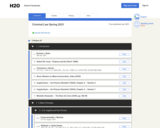
The case Durham v. State serves as an introduction to the criminal law course because of its basic but profound recognition of the violence at the core of the state’s ability to arrest and punish individuals who resist the law. Law enforcement depends on force, that is, state coercion of individuals to obey the law and to submit to legal authority, through the threat of punishment.
This course deals with the what, why, and how of criminal law: What should be criminal? Why should it be criminal? How do we define a crime, and how should we punish it? It also deals with the “so what” of criminal law: How does it reflect our values? How does it shape our society? How does it contain our views of what it means to be human? What is criminal law for?
Throughout the course we will also consider the common justifications of criminal punishment: (1) retribution; (2) deterrence; (3) incapacitation; and (4) rehabilitation.
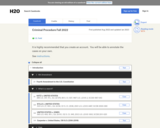
Welcome to Criminal Law II, a journey through the law of constitutional criminal procedure. This publicly available casebook is a substitute for a textbook you would otherwise purchase through the University bookstore. It contains the cases you are to read for each unit. The cases have been elided, so portions represented by blue ellipses are not required reading. You are nevertheless more than welcome to click the dots to read through the entire case.
One of the purposes behind Criminal Law II, as taught in the undergraduate department of Criminal Justice, is to explore and define the concept of "good police." Credit is owed to Det. Jimmy McNulty of The Wire, who embodies crucial aspects of good police.
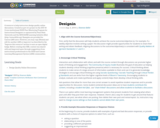
A resource to help instructors design quality online discussions.
Created as part of a project in the 2017-18 Cross-institutional ID2ID Peer Mentoring Program for Instructional Designers co-sponsored by Penn State University and the EDUCAUSE Learning Initiative (ELI) (http://www.id2id.org). Examples are provided for Canvas LMS users. However, you may copy (Remix) and edit for another LMS or improve it as described in the "Improve this resource" section to earn an open digital badge.
Before creating this OER, content was shared with and improved upon through suggestions from instructional professionals in the ID2ID and Canvas Learning Management System (LMS) communities.
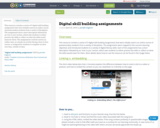
This resource contains a series of 9 digital skill building assignments that were initially used in an online course of postsecondary students from a variety of disciplines. The assignments have a short description followed by an 'over to you' section, which asks students to either practice the skills or reflect on what the skills would mean for them. The assignments could be used in an online class, as a hands-on activity during a face-to-face course, or assigned for students to complete on their own time, outside of class.
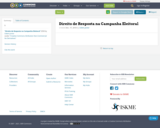
k
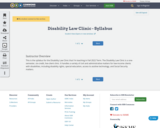
This is the syllabus for the Disability Law Clinic that I'm teaching in Fall 2022 Term. The Disability Law Clinic is a one-semester, six-credit, live-client clinic. It handles a variety of civil and administrative matters for low-income clients with disabilities, including disability rights, special education, access to assitive technology, and Social Security matters.
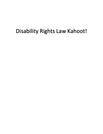
This game is designed to test, reinforce, and enhance students' understanding of Disability Rights Law. I've used it in several different ways: as a game that students play in class, with a prize for the winning student or team (playing the game and discussing the correct answers takes about one hour of class time); as a closed-book quiz that students take in class, followed by discussion of the correct answers (again, about one hour of class time); and as an open-book assignment that students complete before class, followed by discussion of the correct answers in class (about 30 minutes of class time).

This is a syllabus for the Leadership Masterclasses designed for the Honours Master Programme, University of Groningen (the Netherlands).
The main aim of the Masterclass is to challenge students to test their own ideas on the relationship between leadership and innovative thinking and dissidence. By the end of the Masterclass, students will be able to:
▪ Understand and explain the role of innovative thinking and dissidence in producing and progressing different fields of research;
▪ Analyse and assess the role of inter-cultural understanding in making leadership decisions;
▪ Value interdisciplinary approaches in tacking global challenges;
▪ Critically reflect on how to apply these insights to their own future professions.
The Masterclass has a concrete compass: the students study, by way of example, the work of Judge and Professor at the University of Groningen Bert Röling who introduced new ways to look at international law and created news fields of interdisciplinary research.
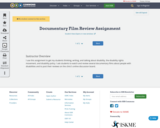
I use this assignment to get my students thinking, writing, and talking about disability, the disability rights movement, and disability policy. I ask students to watch and review several documentary films about people with disabilities and to post their reviews on the clinic's online discussion board.